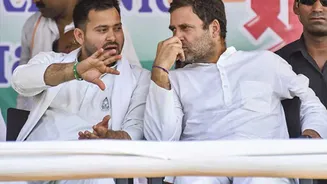What is the story about?
The Congress party finds itself in a peculiar situation in Bihar's political landscape this election season. While the party has filed nominations for 61 seats under the Grand Alliance seat-sharing arrangement, its real test lies in 52 constituencies where it faces not only Opposition challenges but also discontent within the alliance itself.
Out of the 61 seats allotted to Congress, nine are witnessing a "friendly contest," with candidates from the Rashtriya Janata Dal (RJD) or Left parties entering the fray against Congress nominees. Political analysts told News18 Hindi that this intra-alliance competition could directly dent the party's vote share in these constituencies.
History against Congress on half its seats
A closer look at the electoral history of these 52 key seats presents a sobering picture for Congress. Since the 2008 delimitation, Bihar has seen seven assembly elections. Of these, 23 seats have never been won by any Grand Alliance constituent — neither Congress, RJD, nor the Left. These areas have traditionally remained strongholds of the NDA or independent candidates.
Moreover, in 38 out of the 52 seats, Grand Alliance parties have either never won or have managed victory only once. This historical trend suggests that Congress faces a formidable uphill battle in most of the constituencies it is contesting this time.
A strategic, yet risky, rehabilitation attempt
Political observers see this election as a strategic rehabilitation exercise for the Congress in Bihar. Instead of focusing on its traditional strongholds, the party is contesting in areas where it has been nearly wiped out in recent years.
Two key factors are said to be driving this approach. First, the RJD's dominant position within the Grand Alliance has forced Congress to settle for relatively weaker seats. Second, Congress aims to rebuild its grassroots organisation and regain political relevance ahead of the next Lok Sabha elections.
However, the question remains — will this long-term strategy yield any short-term gains?
The arithmetic of 61 seats
The Congress's major hurdle remains its organisational weakness and lack of charismatic local leadership. Unlike the RJD, the party does not have a strong state-level face capable of mobilising voters across districts.
In the 2020 assembly elections, Congress contested 70 seats but managed to win only 19. Reducing its contest to 61 this time is being viewed as a strategic retreat, framed by party leaders as an approach of "fewer seats, better focus".
The Congress campaign has centered on issues like unemployment, inflation, education, and social justice, but these themes have failed to resonate strongly without dynamic local leadership. The prominence of RJD leader Tejashwi Yadav often overshadows Congress voices, leaving the party dependent on the goodwill and vote transfer from its allies — a prospect many analysts find uncertain.
Fight for survival, not just seats
Experts believe Congress is now fighting for survival rather than ideological dominance in Bihar. Winning even 15 to 20 of its 52 contested seats would be considered a significant morale boost. A poor showing, on the other hand, could further weaken its bargaining power within the Grand Alliance.
Ultimately, this election is about more than just numbers for Congress — it's about preserving credibility and reclaiming relevance in a state where history has seldom been on its side.
Out of the 61 seats allotted to Congress, nine are witnessing a "friendly contest," with candidates from the Rashtriya Janata Dal (RJD) or Left parties entering the fray against Congress nominees. Political analysts told News18 Hindi that this intra-alliance competition could directly dent the party's vote share in these constituencies.
History against Congress on half its seats
A closer look at the electoral history of these 52 key seats presents a sobering picture for Congress. Since the 2008 delimitation, Bihar has seen seven assembly elections. Of these, 23 seats have never been won by any Grand Alliance constituent — neither Congress, RJD, nor the Left. These areas have traditionally remained strongholds of the NDA or independent candidates.
Moreover, in 38 out of the 52 seats, Grand Alliance parties have either never won or have managed victory only once. This historical trend suggests that Congress faces a formidable uphill battle in most of the constituencies it is contesting this time.
A strategic, yet risky, rehabilitation attempt
Political observers see this election as a strategic rehabilitation exercise for the Congress in Bihar. Instead of focusing on its traditional strongholds, the party is contesting in areas where it has been nearly wiped out in recent years.
Two key factors are said to be driving this approach. First, the RJD's dominant position within the Grand Alliance has forced Congress to settle for relatively weaker seats. Second, Congress aims to rebuild its grassroots organisation and regain political relevance ahead of the next Lok Sabha elections.
However, the question remains — will this long-term strategy yield any short-term gains?
The arithmetic of 61 seats
The Congress's major hurdle remains its organisational weakness and lack of charismatic local leadership. Unlike the RJD, the party does not have a strong state-level face capable of mobilising voters across districts.
In the 2020 assembly elections, Congress contested 70 seats but managed to win only 19. Reducing its contest to 61 this time is being viewed as a strategic retreat, framed by party leaders as an approach of "fewer seats, better focus".
The Congress campaign has centered on issues like unemployment, inflation, education, and social justice, but these themes have failed to resonate strongly without dynamic local leadership. The prominence of RJD leader Tejashwi Yadav often overshadows Congress voices, leaving the party dependent on the goodwill and vote transfer from its allies — a prospect many analysts find uncertain.
Fight for survival, not just seats
Experts believe Congress is now fighting for survival rather than ideological dominance in Bihar. Winning even 15 to 20 of its 52 contested seats would be considered a significant morale boost. A poor showing, on the other hand, could further weaken its bargaining power within the Grand Alliance.
Ultimately, this election is about more than just numbers for Congress — it's about preserving credibility and reclaiming relevance in a state where history has seldom been on its side.





















